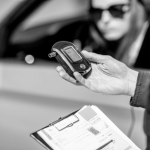Contributor: Adam Justinger
The Fourth Amendment of the United States Constitution and Article 1 Section 8 of the North Dakota Constitution prohibit unreasonable searches and seizures. So, if you are stopped for a DUI, can an officer ask you for a warrantless urine test? This question has been answered recently by both the Minnesota Supreme Court and the North Dakota Supreme Court.
Chemical Testing And The United States Supreme Court’s Holding In Birchfield
To fully understand this issue, it is important to know what the United States Supreme Court held in Birchfield v. North Dakota. If you are unfamiliar with the Birchfield decision, check out one of our past blogs on the issue. In short, Birchfield held that warrantless blood tests incident to a lawful arrest are unconstitutional. However, the Court also held that warrantless breath tests are a constitutional incident to a lawful arrest. The United States Supreme Court analyzed three factors in determining the constitutionality of warrantless chemical testing: 1) the extent of the physical intrusion upon the individual to obtain the evidence; 2) the extent to which the evidence could be preserved to provide additional, unrelated private information; and 3) the extent to which participation in the search would enhance the embarrassment of the arrest. Although the United States Supreme Court ruled on blood and breath tests, they did not make a decision on warrantless urine tests. So, is a warrantless urine test a constitutional incident to a lawful arrest?
Warrantless Urine Testing In Minnesota And North Dakota
In 2016, the Minnesota Supreme Court heard State v. Thompson and had to determine whether a warrantless urine test incident to a lawful arrest was constitutional. In 2017, the North Dakota Supreme Court heard State v. Helm, and had to decide the same issue. Both the Minnesota Supreme Court and the North Dakota Supreme Court held that warrantless urine tests incident to a lawful arrest are unconstitutional. In determining this, the courts looked at the three factors established in Birchfield. Both courts agreed that the physical intrusion of a urine test is more similar to a breath test. However, in making their decision, the courts both recognized that a warrantless urine test had major privacy concerns. A warrantless urine test requires an individual to urinate in front of a law enforcement officer, which can be extremely embarrassing to an individual. The courts also recognized that preservation of a urine sample allows officers to have access to a wide range of information, which is similar to a blood test. Some of the information urine tests can show include: if a person has a sexually transmitted disease, if they are pregnant, or if a person has diabetes. For those reasons, the courts agreed that a warrantless urine test is more similar to a warrantless blood test, and thus is an unconstitutional incident to an arrest.
So, if you are stopped by a law enforcement officer and he/she requests a warrantless urine test incident to a lawful arrest, you cannot be criminally prosecuted in North Dakota or Minnesota for refusing the warrantless urine test. However, if an officer receives a warrant, you will likely need to submit to a chemical urine test or you could face criminal penalties. It should also be noted that other exceptions to the warrant requirement may apply. These exceptions may include but are not limited to, consent, and exigent circumstances. It should also be noted that refusal to submit to a warrantless urine test may have administrative penalties, such as having your driver’s license revoked regardless of whether an officer has a warrant. See N.D.C.C. § 39-20-01(3)(a), and Minn. Stat. § 169A.52.
In Conclusion
DUI law and laws regarding chemical testing can be complex, and seeking legal representation may be in your best interest. If you have a criminal issue in North Dakota, please do not hesitate to call the Criminal Defense Team at SW&L Attorneys in Fargo at 701-297-2890.
This article is only meant to provide general information and does not constitute legal advice.










